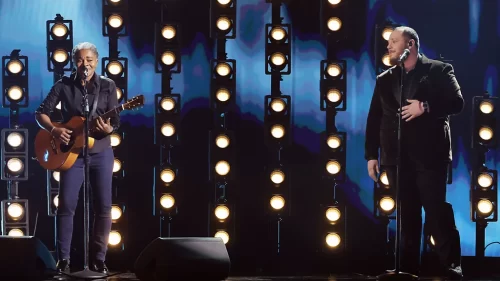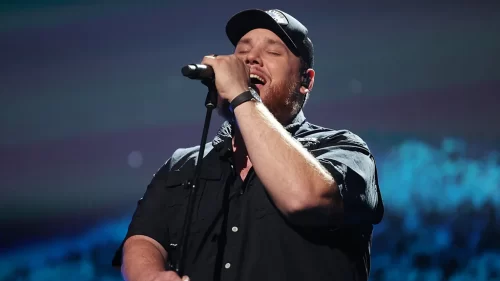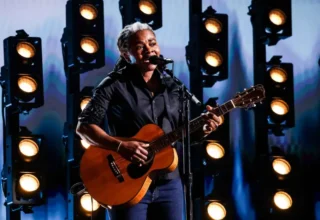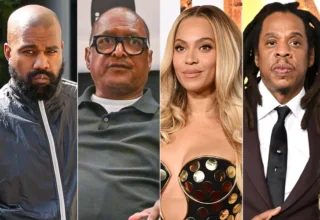
Tracy Chapman gave a rare live performance of Fast Car with Luke Combs at the 66th Annual Grammy Awards, receiving a standing ovation and cheers from Oprah Winfrey. In 1988, she became a star when she stepped in for Stevie Wonder at the last minute at Nelson Mandela’s 70th birthday concert.
“I had a feeling I could be someone, be someone, be someone,” Luke Combs sings yearningly on Fast Car, a song about escaping from poverty that was first made famous by its writer, Tracy Chapman, in 1988.
Thirty-five years after winning a Grammy for best female pop vocal performance for Fast Car, Chapman once again took to the stage to sing her hit song alongside Combs. The pair – from different generations and musical genres – performed their duet to cheers from an audience that included Taylor Swift and Kelly Clarkson, ending with a standing ovation and raised hands from Oprah Winfrey.
The last time Chapman performed in public was in 2020, and before that in 2015. At the Grammys, she initially appeared in the shadows – once people worked out who was on stage, loud applause broke out before dimming to a hush as the crowd was brought to a stand-still and she sang the opening lyrics.
It’s been quite a year for the song. Led by a finger-picked guitar intro that instantly evokes memories of Chapman’s original, Combs’ faithful but fuller-sounding version climbed to number two on the Billboard Hot 100 in July.
When it was named song of the year by the Country Music Association in November, Chapman became the first black woman ever to receive this prestigious songwriting prize. Combs has been lauded, too, with a Grammy nomination for best country solo performance (Chris Stapleton won it for White Horse).

Released as the lead single from her self-titled debut album, Chapman’s Fast Car gained momentum when she performed it at Nelson Mandela’s 70th birthday concert in June 1988. Chapman’s LP had sold respectably since it came out that April, but the tribute concert at London’s Wembley Stadium introduced her to a huge global audience watching on TV. The Cleveland-born singer-songwriter initially delivered a three-song set – consisting of Why?, Behind the Wall and Talkin’ Bout a Revolution – in between comedy double act Fry and Laurie and Scottish band Wet Wet Wet. Then she benefitted from a fortuitous twist of fate.
Just as Stevie Wonder was about to begin a surprise set, he discovered that a hard disk containing his backing tracks had gone missing. Wonder decided he was unable to perform, so Chapman was asked to fill in at the last minute because she could come on quickly with just her guitar. Her stunning renditions of Fast Car and Across the Lines, a scalpel-sharp song about racial separation, made her a star and sent the album to the top of the charts around the world. Her eponymous debut went on to sell more than 20 million copies worldwide and earn a reputation as one of the all-time great singer-songwriter albums.
The Mandela concert performance also burned Fast Car into the popular consciousness, in particular – a place it has never really left thanks to consistent radio airplay over the years and popular cover versions including Combs’s. “Every car journey I had as a child was soundtracked by that song,” says British singer-songwriter Paloma Faith, who was seven years old when Chapman’s Fast Car became a hit in the UK. After the Mandela concert, Chapman’s impossibly tender and affecting song also gained more exposure in her native US, where it peaked at number six on the Billboard Hot 100. The following year, Fast Car picked up three Grammy nominations, including one for best female pop vocal performance, which Chapman won.
How the song peaked in 2023
Still, 2023’s hugely popular cover version by Combs, a singer-songwriter from Nashville via North Carolina who has become one of country music’s brightest new stars, has taken Fast Car to a brand new destination: number one on the Billboard country airplay charts. “I never expected to find myself on the country charts, but I’m honoured to be there,” Chapman told Billboard in July. For Hugh McIntyre, a music journalist with Forbes, the fact that Combs recorded Fast Car in a different genre isn’t necessarily a key component of the cover’s success. “I think his version has struck a chord largely because of the song itself,” he says. “Combs has a big enough platform to reach people who either didn’t know the song or do remember it, but perhaps haven’t heard it in a while.”

It inspired a sense of freedom in me and liberation to choose who I am and where I go and reminds me I can leave whenever I want – Paloma Faith
However the success of Combs’ cover wasn’t viewed by everyone as a wholly positive development. In July, The Washington Post’s Emily Yahr wrote an article titled Tracy Chapman, Luke Combs and the complicated response to Fast Car in which she argued that the song’s chart-topping success has been partly “clouded by the fact that, as a black queer woman, Chapman, 59, would have almost zero chance of that achievement herself in country music”. Indeed, when Combs’s Fast Car climbed to the top spot, Chapman became the first black woman ever to have a sole songwriting credit on a number one country song.
Courtney Smith, music critic and author of Record Collecting for Girls, says she “did a double take” when she first heard Combs’s cover version because it retains a broad musical similarity to Chapman’s original. “I was surprised that a white man in country music would have connected with a song that was released two years before he was born,” she says. “And even more surprised that he recorded it, and his label made it a single.” For Smith, Combs’s unexpected choice of cover “speaks to the nostalgia in the country genre but pushes it away from a nostalgia for rock music and towards something less definitively Southern and male”.
While Combs’s version could be viewed as an example of cultural appropriation – or at least of a white man benefitting disproportionately from a black woman’s handiwork – it also underlines the universality of the beautifully expressed sentiments in Chapman’s songwriting. Fast Car’s evocative opening salvo – “You got a fast car, I want a ticket to anywhere” – resonates with anyone who’s ever craved a better station in life. For her part, Chapman has responded graciously to Combs’s success, saying in her Country Music Association acceptance speech: “I’m sorry I couldn’t join you all tonight. It’s truly an honour for my song to be newly recognised after 35 years of its debut. Thank you to the CMAs and a special thanks to Luke and all of the fans of Fast Car.”
Certainly, Combs isn’t the first artist to rework Chapman’s classic for a new audience. In 2015, British DJ-producer Jonas Blue released a tropical house cover of Fast Car that became a sizeable chart hit in Australia, the UK and many other European countries. In an interview with Idolator, Blue admitted that he was initially “scared” to record Fast Car because “it’s such a legendary song [that] it’s like trying to cover The Beatles”. McIntyre believes Fast Car’s success in several different genres points to the transcendent quality of its subject matter. “There is a feeling embedded within the lyrics that is hard to describe, but Chapman has so brilliantly and beautifully put words to it,” he says.
Why its lyrics resonate so powerfully
Though difficult to pinpoint, this feeling is ineffably wistful and incredibly poignant. Fast Car begins with the narrator – who is never named or gendered – dreaming of a better life after managing to save “just a little bit of money” from their work at a convenience store. In the third verse, we learn that the narrator had a tough start in life because their father drank and their mother walked out. “I said, ‘Somebody’s gotta take care of him’, so I quit school and that’s what I did,” they tell us, heartbreakingly. Though the narrator is initially optimistic because their romantic partner appears to have prospects – “I know things will get better, you’ll find work and I’ll get promoted” – at the song’s climax we hear that history has cruelly repeated itself. The narrator is still working hard to provide for someone, this time their partner, who now stays “drinking late at the bar”. The narrator’s feeling that they “could be someone, be someone, be someone” is just a distant memory.
Though the song’s optimism ultimately dissipates, the image of a “fast car” speeding away from a difficult situation remains extremely powerful
Chapman has said that while Fast Car isn’t “directly autobiographical”, it was partly inspired by her own hardscrabble childhood. “It very generally represents the world that I saw when I was growing up in Cleveland, Ohio, coming from a working-class background, being raised by a single mom and being in a community of people who were struggling,” she said on the BBC radio show Striking a Chord. Though the song’s optimism ultimately dissipates, the image of a “fast car” speeding away from a difficult situation remains extremely powerful. “It inspired a sense of freedom in me and liberation to choose who I am and where I go, and reminds me I can leave whenever I want,” says Faith who, like Chapman, was raised by a lone mother in a working-class neighbourhood.







